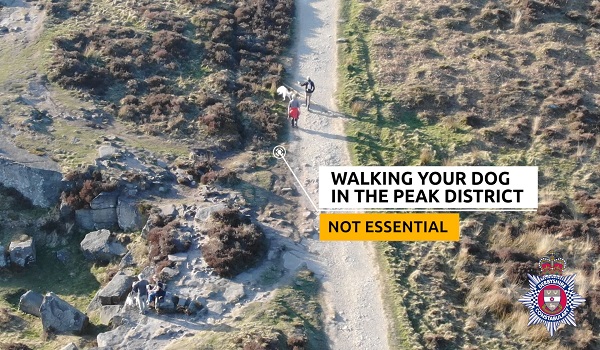Force apologises over stalking failures as it reforms systems
Staffordshire Police has seen reports of stalking almost double after it changed policies, training and practice following the failure to connect over 30 contacts from a victim before her death.
An Independent Office for Police Conduct (IOPC) investigation heavily criticised the force’s response to incidents involving stalking victim Justene Reece from September 2016 to when she died in February 2017.
The IOPC said Ms Reece’s death has led to the force accepting training recommendations to improve the linking of incidents and crimes.
Ms Reece took her own life following a sustained campaign of harassment by her ex-partner, Nicholas Allen, who was jailed for ten years in June 2017 after admitting manslaughter, engaging in coercive or controlling behaviour and stalking.
Complaints were made about the actions taken by officers after they were contacted by Ms Reece, her family and friends who were also targeted by Mr Allen, and other agencies.
Contrary to force policies, Staffordshire Police had consistently failed to cross-reference incidents and crimes reported to them on force computer systems. Of the 34 incidents reported to the force, 16 were not cross-referenced with any previous ones, and many of the remainder were only cross-referenced to one other incident rather than to a range. Seven of the 14 incidents reported by Ms Reece were not cross-referenced at all, the IOPC investigation found.
In six of 13 domestic incidents recorded, a mandatory domestic abuse risk assessment was not carried out, which was also in breach of force policy.
In nearly half (16) of the incidents, no research or intelligence checks were made, as they should have been in a domestic abuse case.
The force agreed that, although it did not amount to misconduct, the performance of a now retired senior officer was unsatisfactory in relation to advice given not to arrest Mr Allen for a reported breach of a non-molestation order (NMO) in December 2016.
It was one of seven NMO breaches by Mr Allen that Ms Reece reported to the force during the period under investigation.
Seven officers and one member of police staff have received management action in the form of advice as their performance did not meet expected standards in relation to issues such as the handling of calls and not completing risk assessments.
IOPC Regional Director Derrick Campbell said: “Our sympathies are with the family of Justene Reece and all those affected by her tragic death.
“It is evident from our investigation that there were potential opportunities for the police to engage more robustly with Mr Allen.
“Officers were largely deployed to incidents appropriately, but a failure to cross-reference incidents led to them being treated in isolation, and a lost opportunity to recognise the scale of Mr Allen’s offending. The bigger picture of the level of harassment and stalking being perpetrated was not properly seen by police. We took the view that the prevalence of inconsistent practice among call handlers in cross-referencing indicated a training issue for the force, rather than a series of unrelated errors by individuals.”
Staffordshire Police Deputy Chief Constable Nick Baker said training on cross-referencing incidents and crimes so the full picture of alleged offending and associated risk is considered will take place and an IT system (Niche RMS), which collates data from multiple systems and shows incident history in one place, is being purchased.
A dedicated stalking risk assessment tool has been introduced which requires officers to examine the wider circumstances in each case, to identify patterns of stalking behaviour and ensure that all investigative opportunities are being pursued. Officers and police staff have received refreshed stalking and harassment training including from national stalking charity Paladin.
Between February 2018 and February 2019, there were 832 recorded crimes of stalking across the force area, an increase of 174 per cent. The force is now eighth nationally for recorded volume of stalking cases, which shows that people are more prepared to report incidents of stalking and harassment to police, the force said.
Mr Baker said: “Our systems are now able to capture stalking offenders as a standalone category so risks and offences can be captured at an early stage and victims can be given support and resources put in place.”
The force also has 24 specially trained Single Points of Contact (SPOCs) influencing investigative and safeguarding practice.
Mr Campbell said: “I am pleased that Staffordshire Police has accepted our learning recommendations that all staff and officers who use the relevant systems should be further trained in the effective cross-referencing of incidents and crimes. This case has shown its importance, along with effective research checks, in helping police to join the dots and safeguard vulnerable people.”
Mr Baker added: “As a force we deeply regret Justene Reece’s death in 2017. The Independent Office for Public Conduct’s (IOPC) investigation has rightly scrutinised the actions of the force and identified important areas for improvement.
“Seven officers and a member of police staff will receive non-disciplinary action – management action by way of words of advice – for not complying with force policy/procedures.
“We acknowledge the findings of this report, which highlights that over 30 separate contacts were made with the force, despite which cross reference connections were not made and for this I apologise.
“Since the tragic death of Justene we have made improvements to our safeguarding and investigative approach to stalking, but we have more work to do. We are committed to ensuring officers and staff understand stalking and its devastating impact so they can better respond to incidents reported to us.”
The events are also subject to an ongoing multi-agency Domestic Homicide Review.







